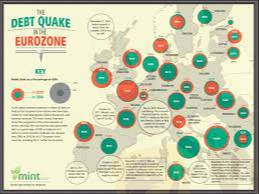
2025-02-18 01:03
业内THE EFFECTS OF THE EUROPEAN SOVEREIGN DEBT CRISIS
#firstdealofthenewyearastylz
The European Sovereign Debt Crisis (2009–2012) had a significant impact on forex markets, mainly affecting the euro (EUR) and global currency stability. Here’s how it influenced forex trading:
1. Euro (EUR) Depreciation
Investors lost confidence in the euro due to rising debt in Greece, Spain, Italy, and other European nations.
Many traders sold off euros, causing the EUR/USD to decline sharply.
Example: In 2011, the EUR/USD fell from around 1.49 to 1.20, showing a major loss in value.
2. Flight to Safe-Haven Currencies
Traders shifted funds to safer currencies like:
US Dollar (USD) → Strengthened as investors saw the U.S. as a stable economy.
Swiss Franc (CHF) → Surged in value, forcing the Swiss National Bank (SNB) to intervene and cap its exchange rate.
Japanese Yen (JPY) → Gained strength as investors moved capital to Japan.
3. Increased Forex Volatility
The crisis caused panic selling and high uncertainty, leading to unpredictable swings in forex prices.
Central banks, like the European Central Bank (ECB), had to intervene with bailouts and stimulus programs, which also affected forex trends.
4. Weakening of Eurozone Trade Partners
Countries with close economic ties to Europe (e.g., the UK) saw their currencies affected.
The British pound (GBP) also faced pressure due to exposure to European debt.
5. Policy Actions Shaped Forex Trends
The ECB introduced quantitative easing (QE) and lower interest rates, making the euro less attractive to investors.
International financial institutions like the IMF and the EU bailout funds helped stabilize the euro over time.
Bottom Line
The European Sovereign Debt Crisis led to:
✅ Euro depreciation
✅ Strengthening of safe-haven currencies (USD, CHF, JPY)
✅ High forex market volatility
✅ Policy interventions that shaped currency movements
赞 0

Momo403
Brokers
热门讨论
业内
哎,现在明白不赌就是赢啊
行情分析
美元/加元技术面
技术指标
外汇技术分析之波浪理论
业内
[活動]論交易,贏取200元話費補貼
技术指标
EZ.Fury Kite是基于趋势指标MA进行判断
技术指标
指标派是什么?
集市分类

平台

展会

IB

招聘

EA

业内

行情

指标
THE EFFECTS OF THE EUROPEAN SOVEREIGN DEBT CRISIS
 香港 | 2025-02-18 01:03
香港 | 2025-02-18 01:03#firstdealofthenewyearastylz
The European Sovereign Debt Crisis (2009–2012) had a significant impact on forex markets, mainly affecting the euro (EUR) and global currency stability. Here’s how it influenced forex trading:
1. Euro (EUR) Depreciation
Investors lost confidence in the euro due to rising debt in Greece, Spain, Italy, and other European nations.
Many traders sold off euros, causing the EUR/USD to decline sharply.
Example: In 2011, the EUR/USD fell from around 1.49 to 1.20, showing a major loss in value.
2. Flight to Safe-Haven Currencies
Traders shifted funds to safer currencies like:
US Dollar (USD) → Strengthened as investors saw the U.S. as a stable economy.
Swiss Franc (CHF) → Surged in value, forcing the Swiss National Bank (SNB) to intervene and cap its exchange rate.
Japanese Yen (JPY) → Gained strength as investors moved capital to Japan.
3. Increased Forex Volatility
The crisis caused panic selling and high uncertainty, leading to unpredictable swings in forex prices.
Central banks, like the European Central Bank (ECB), had to intervene with bailouts and stimulus programs, which also affected forex trends.
4. Weakening of Eurozone Trade Partners
Countries with close economic ties to Europe (e.g., the UK) saw their currencies affected.
The British pound (GBP) also faced pressure due to exposure to European debt.
5. Policy Actions Shaped Forex Trends
The ECB introduced quantitative easing (QE) and lower interest rates, making the euro less attractive to investors.
International financial institutions like the IMF and the EU bailout funds helped stabilize the euro over time.
Bottom Line
The European Sovereign Debt Crisis led to:
✅ Euro depreciation
✅ Strengthening of safe-haven currencies (USD, CHF, JPY)
✅ High forex market volatility
✅ Policy interventions that shaped currency movements
赞 0
我也要评论
提问
0条评论

还没人评论,赶紧抢占沙发

提问
还没人评论,赶紧抢占沙发